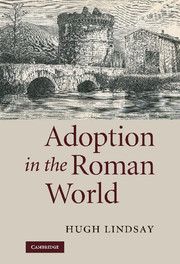Book contents
- Frontmatter
- Contents
- List of figures
- Preface
- List of abbreviations
- Introduction
- 1 Adoption, kinship and the family: cross-cultural perspectives
- 2 Kinship in Greece and Rome
- 3 Greek adoptions: comparisons and possible influences on the Roman world
- 4 Procedural aspects of Roman adoption
- 5 The testamentary adoption
- 6 Roman nomenclature after adoption
- 7 Adoption and inheritance
- 8 Roman freedmen and their families: the use of adoption
- 9 Adoption in Plautus and Terence
- 10 Sallust and the adoption of Jugurtha
- 11 Adrogatio and adoptio from Republic to Empire
- 12 Testamentary adoptions – a review of some known cases
- 13 Political adoptions in the Republic
- 14 Clodius and his adoption
- 15 The adoption of Octavian
- 16 Political adoption in the early Empire at Rome, Pompeii and Ostia; the imperial family
- Conclusion
- Glossary
- References
- Index
7 - Adoption and inheritance
Published online by Cambridge University Press: 25 January 2010
- Frontmatter
- Contents
- List of figures
- Preface
- List of abbreviations
- Introduction
- 1 Adoption, kinship and the family: cross-cultural perspectives
- 2 Kinship in Greece and Rome
- 3 Greek adoptions: comparisons and possible influences on the Roman world
- 4 Procedural aspects of Roman adoption
- 5 The testamentary adoption
- 6 Roman nomenclature after adoption
- 7 Adoption and inheritance
- 8 Roman freedmen and their families: the use of adoption
- 9 Adoption in Plautus and Terence
- 10 Sallust and the adoption of Jugurtha
- 11 Adrogatio and adoptio from Republic to Empire
- 12 Testamentary adoptions – a review of some known cases
- 13 Political adoptions in the Republic
- 14 Clodius and his adoption
- 15 The adoption of Octavian
- 16 Political adoption in the early Empire at Rome, Pompeii and Ostia; the imperial family
- Conclusion
- Glossary
- References
- Index
Summary
Many Roman adoptions are directly about the inheritance of estates. I shall be examining the use of adoption as a strategy for succession under Roman law, with a main focus on the period from 200 bc to ad 200. It is admittedly a difficult task, since a majority of our legal sources took final form rather later than this, some as late as the age of Justinian (ad 527–65). Gaius' Institutes provides the theory from the second century ad, the age of the Antonines, while Justinian's Digest and Institutes are valuable for the accumulated theory on adoption and emancipation. Nevertheless, the earlier period is more extensively illuminated by literary sources, and in consequence it is here that we can engage in detailed comparison of legal rules and social practice. It is to be hoped that a plausible picture may emerge, and that as far as possible anachronism can be avoided.
family life and patria potestas
To understand the mechanisms employed for passing property from one generation to its successor at Rome, certain aspects of family life in that context have to be appreciated. Marriages under Roman law by the late Republic fell into two main categories, according to the intention of the parties (Corbett [1930]; Treggiari [1991a]). In the earlier form, the woman passed into the manus of her husband. This meant that she left the agnatic family of birth just as fully as if she had undergone adoption.
Information
- Type
- Chapter
- Information
- Adoption in the Roman World , pp. 97 - 122Publisher: Cambridge University PressPrint publication year: 2009
